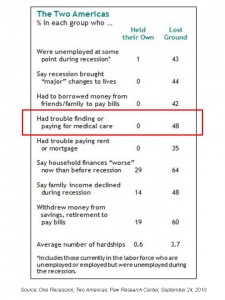 There are two faces of America in The Great Recession: one is doing pretty well, thank you very much; the other is losing ground, and a lot of it.
There are two faces of America in The Great Recession: one is doing pretty well, thank you very much; the other is losing ground, and a lot of it.
One Recession, Two Americas from the Pew Research Center is a survey of Americans’ home economics 30 months since the start of the recession which began in December 2007. The recession technically ended in June 2009, according to the National Bureau of Economic Research (NBER). One year after that ‘technical’ end, though, it appears about 1 in 2 Americans haven’t gotten the memo.
Some of the Pew’s survey results appear in the chart. See the red-boxed line item: “Had trouble finding or paying for medical care.” None of those who are ‘holding their own’ in the economic downturn have had trouble sourcing or funding health care. However, nearly 50% of those who have ‘lost ground’ in the recession have either not been able to get health care or pay for it.
Related issues for those whose home economies have eroded in the recession are worsening financing, with 2/3 of those who have lost ground in worse financial straits than before the downturn; and, 3 in 5 of those losing ground saying they’ve had to take money out of retirement funds and savings to pay for current bills and living expenses. 43% were unemployed at some point during the recession.
Methodology: The Pew Research Center polled a national U.S. sample of 2,967 respondents in May 2010.
Health Populi’s Hot Points: The recession which technically ended in June 2009 hasn’t really ended at all for at least one-half of Americans. The downturn has taken a toll on Americans’ personal finances, and on their health care. These are real risk factors for declining health status: job stress, financial stress, and postponement of necessary health care.
The Pew found some intriguing differences between the post-recession Have’s and Have-Not’s: those who lost ground tend to have less education, be Black or Hispanic, have less money, and…be a Democrat. A plurality have seen cuts in pay and cuts in hours at their jobs.
These are some of the very people the Accountable Care Act seeks to cover with health insurance. The ACA can’t get implemented soon enough to get Americans universally covered so that at least one aspect of our Losing Ground can be turned around. The jobs outlook certainly isn’t improving, whatever else the NBER may say about the “technical” end of the recession. The “real-world” end of the recession, in terms of jobs and health coverage, is nowhere near over.




 Interviewed live on BNN Bloomberg (Canada) on the market for GLP-1 drugs for weight loss and their impact on both the health care system and consumer goods and services -- notably, food, nutrition, retail health, gyms, and other sectors.
Interviewed live on BNN Bloomberg (Canada) on the market for GLP-1 drugs for weight loss and their impact on both the health care system and consumer goods and services -- notably, food, nutrition, retail health, gyms, and other sectors. Thank you, Feedspot, for
Thank you, Feedspot, for  As you may know, I have been splitting work- and living-time between the U.S. and the E.U., most recently living in and working from Brussels. In the month of September 2024, I'll be splitting time between London and other parts of the U.K., and Italy where I'll be working with clients on consumer health, self-care and home care focused on food-as-medicine, digital health, business and scenario planning for the future...
As you may know, I have been splitting work- and living-time between the U.S. and the E.U., most recently living in and working from Brussels. In the month of September 2024, I'll be splitting time between London and other parts of the U.K., and Italy where I'll be working with clients on consumer health, self-care and home care focused on food-as-medicine, digital health, business and scenario planning for the future...